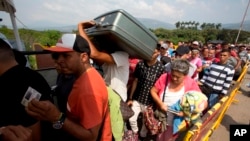Oil-rich Venezuela has for decades been one of Latin America’s most affluent countries. In those days, when Venezuela experienced manpower shortages, thousands of people would cross the border from neighboring Colombia to find work. These days, the shoe is on the other foot.
Thanks in large part to mismanagement by the government of President Nicolas Maduro, Venezuela is in an economic and political crisis. There is no food, no medicine, no jobs, and no end in sight. So, Venezuelans are fleeing the country in droves.
Most are going to Colombia. Every day, around 35,000 people cross the Simon Bolivar International Bridge and head for the closest large city: Cúcuta, just a few kilometers to the north. About half of them purchase food and medicine there, visit family or conduct business and return home. Some keep moving, heading to Chile, Argentina or Peru. But every day, about 5,000 stay in Cúcuta. And when they arrive, nearly all are in need of food and medical attention.
This exodus of Venezuelans desperate to leave the poverty and repression in their native country has been going on for two years now. The people and government of Cúcuta are doing what they can, but they are overwhelmed and underfunded. So, Colombia's president has appealed to the international community for help, and the United States is responding.
On May 8th, the U.S. government announced an additional 18.5 million dollars in bilateral funding to support displaced Venezuelans in Colombia. Subject to Congressional approval, this funding will go toward school feeding programs for children in communities most impacted by the influx; mobile health services to provide vital healthcare for underserved populations; and registry and border data collection systems to help the Government of Colombia make informed and timely decisions regarding Venezuelans seeking assistance.
This new funding complements the more than21 million dollars in humanitarian assistance the United States has provided since 2017 for Venezuelans who have fled their country, and for the neighboring countries hosting them.
We urge the friends and neighbors of Venezuela and Colombia, as well as the global community, to follow our example.






